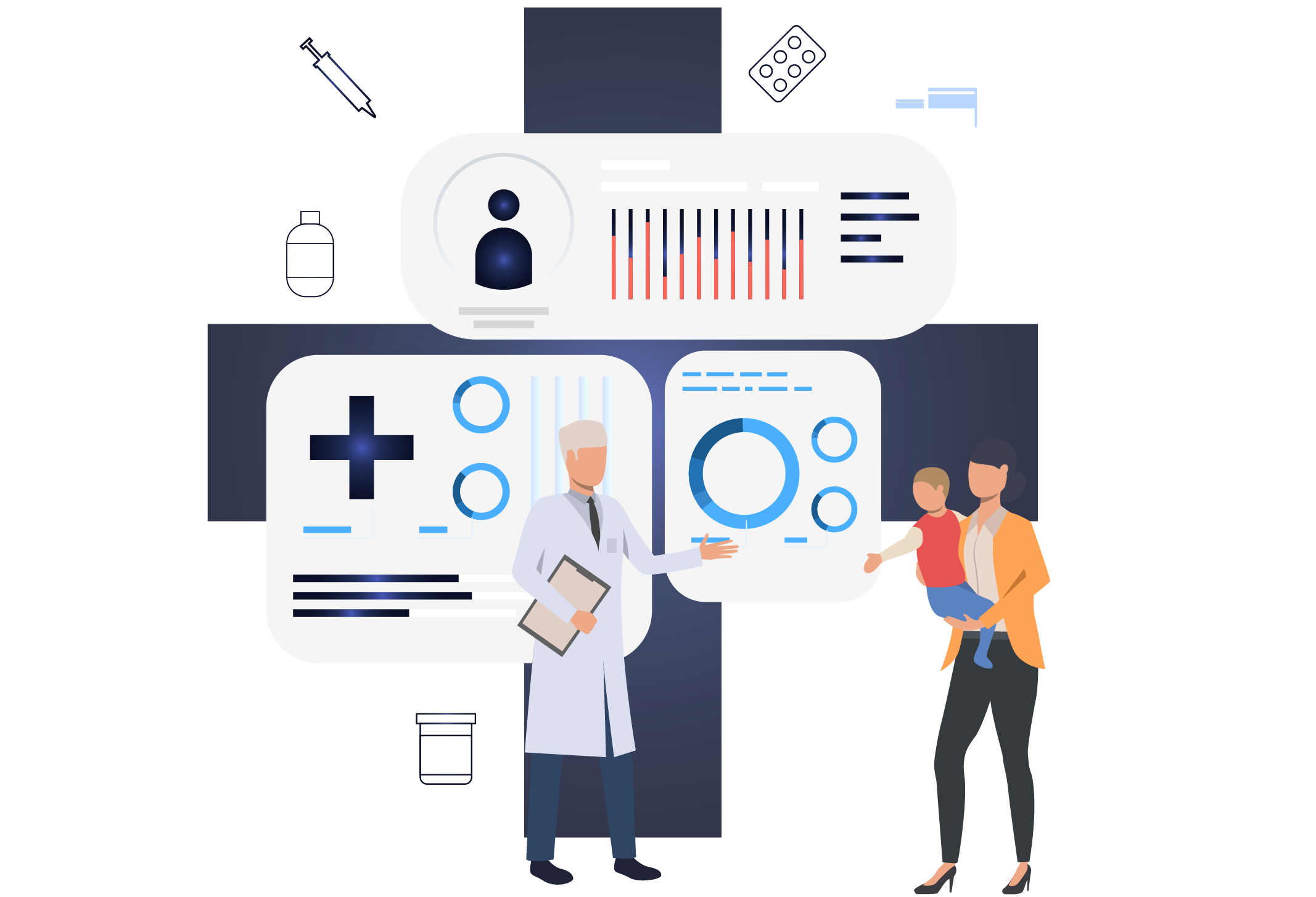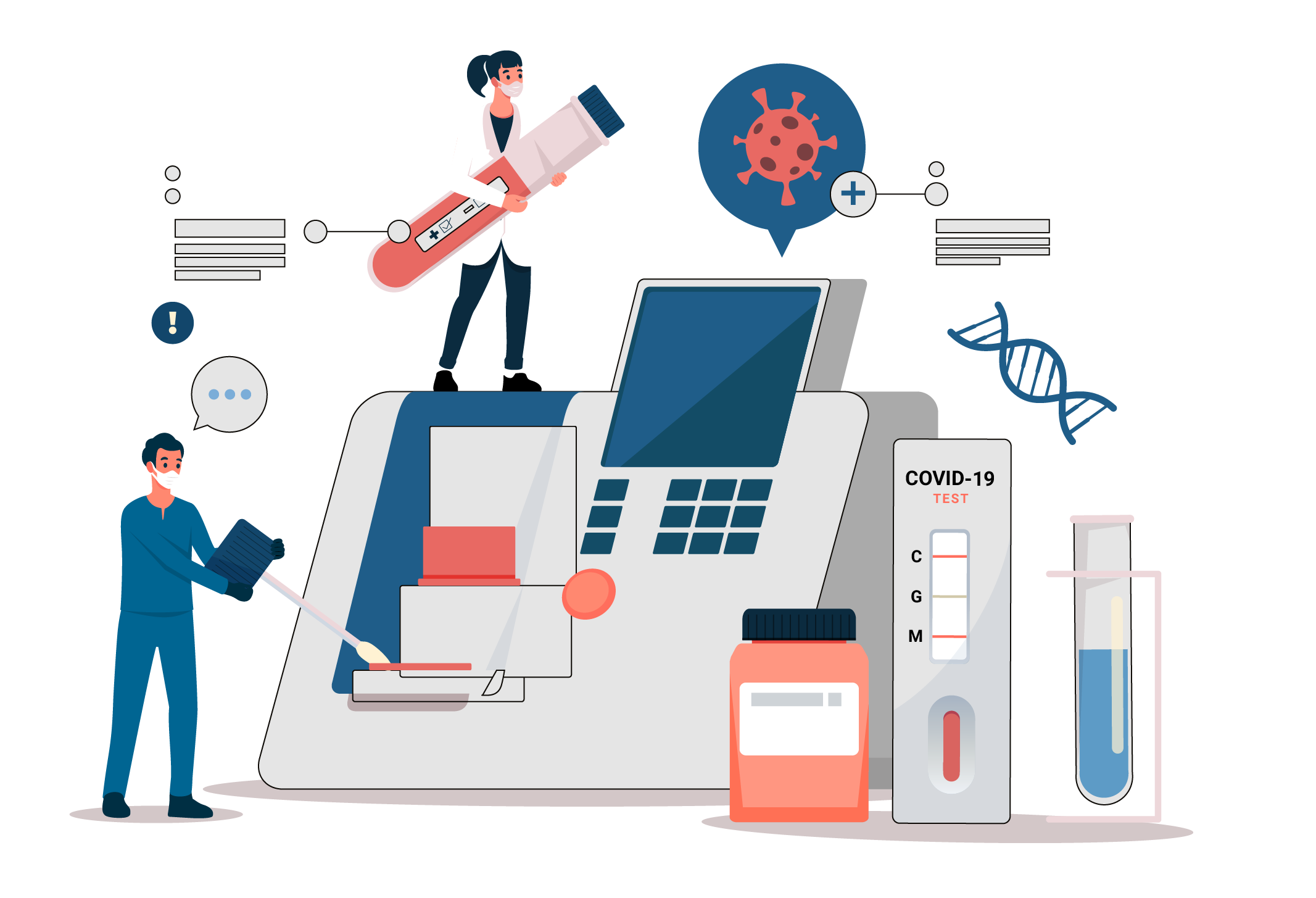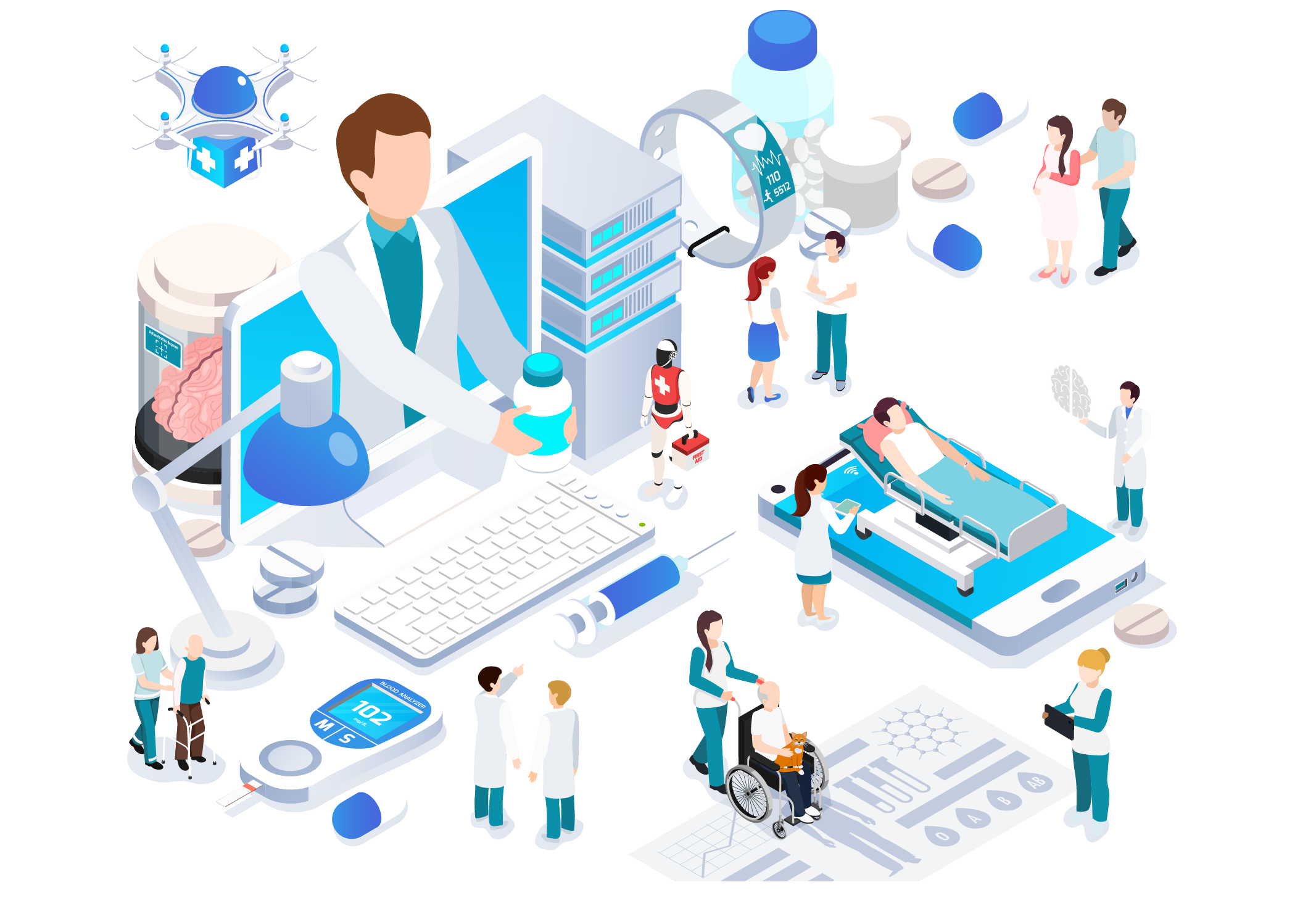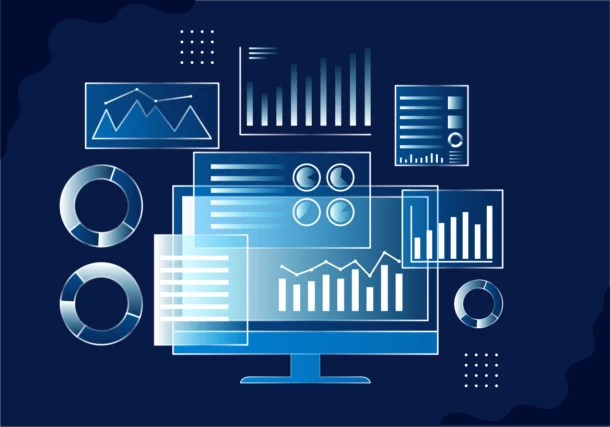The Power of Data-Driven Approaches by Transforming Healthcare
With previously unheard-of breakthroughs and chances to enhance patient outcomes and expedite medical procedures, data science in healthcare is transforming the healthcare sector. Using advanced algorithms and analytical approaches, this strong field leverages massive volumes of data to transform unprocessed information into usable insights. Data science in medical field is becoming more important than ever as healthcare practitioners deal with the issues of an aging population, an increase in chronic illnesses, and a growing need for individualized treatment.

In the medical field, using data-driven methods helps practitioners anticipate patterns, make well-informed judgments, and tailor care to each patient’s unique requirements. For example, illness outbreaks may be predicted using predictive analytics, which enables better resource allocation and preventive actions. Patterns and abnormalities in medical imaging and electronic health records (EHRs) can be found using machine learning algorithms, which can help with early diagnosis. To provide real-time health tracking and prompt actions, wearable technology and remote monitoring systems continually gather patient data.
We will discover the enormous promise that data science offers for the healthcare sector by investigating its transformational influence, useful applications, difficulties, and future trends. This book will highlight the critical role that data-driven techniques play in advancing healthcare, whether you work in the field of data science, are a healthcare professional, or are just an enthusiast keen to learn about new developments. Await inspiration from the astounding ways that data science in healthcare industry is improving people’s lives all across the world.
Data Science in Healthcare for Patient, Diagnosis, and Treatment
Medical practitioners’ approaches to patient care, diagnosis, and therapy are being profoundly altered by the incorporation of data science in healthcare sector. Ever ponder how physicians anticipate medical problems before they worsen? Ultimately, better patient outcomes may be achieved by healthcare practitioners by using data to get deeper insights and make more educated decisions.
The potential of data science in healthcare is to enhance patient care through predictive analytics is among its most important applications in the medical field. Healthcare practitioners are able to anticipate possible health problems before they become serious by evaluating enormous volumes of history and current data. Algorithms for machine learning, for example, are able to recognize patterns that point to the early stages of illnesses, facilitating early intervention and maybe saving lives. Furthermore, by creating individualized treatment regimens based on each patient’s particular requirements, data-driven techniques improve the efficacy of treatments and lessen side effects.

The healthcare industry is already seeing a noticeable improvement as a result of several data-driven projects. To help with precise diagnosis and treatment suggestions, IBM Watson Health, for instance, uses artificial intelligence to evaluate complicated medical data. In a similar vein, people are avoiding vision loss by using Google Health’s AI algorithms to identify diabetic retinopathy early on. Predictive analytics helps hospitals manage resources more effectively, optimize personnel, and shorten patient wait times.
Beyond patient care and diagnosis, data science in healthcare has several advantages. Enhanced efficiency is a crucial benefit since data analytics lower mistakes, expedite administrative work, and enhance overall operational effectiveness. Patients can receive coordinated and ongoing care through electronic health records (EHRs), which facilitate data exchange between healthcare providers. Additionally, data science in healthcare filed makes it possible to recognize patterns and trends in population health, which informs public health policies and tactics.
There is no denying data science in healthcare has had a revolutionary effect. Data-driven initiatives are transforming the business by optimizing therapy, boosting diagnostic accuracy, and providing better patient care. Future health will be made possible by data science’s increasing ability to spur innovation and enhance healthcare results as it develops.
EHRs, Disease Prediction, Wearables, and Drug Discovery with Data Science in Healthcare Industry
Significant progress has been made in the healthcare industry as a result of the use of data science, especially in fields like wearable technology, illness prediction, electronic health record (EHR) analysis, and medication discovery. These apps are transforming healthcare and increasing the effectiveness, precision, and personalization of patient treatment.
The foundation of contemporary healthcare is now electronic health records or EHRs. To find patterns and trends that help predictive analytics and decision support, data scientists can analyze the enormous volumes of patient data kept in electronic health records (EHRs). Healthcare professionals can detect possible health problems and take early action to lessen the chance of serious consequences by evaluating past patient data. In addition to improving resource management, predictive analytics can guarantee that patients receive timely and adequate care.

The current state of disease prediction and risk stratification is led by machine learning algorithms. These algorithms are capable of processing enormous datasets in order to determine risk variables and forecast the probability of conditions including cancer, heart disease, and diabetes. Through risk profile-based patient stratification, healthcare professionals may better target high-risk patients for early intervention and preventative interventions, therefore enhancing overall health outcomes. As they are exposed to additional data, machine learning models learn and get better over time, increasing in accuracy.
Continuous health monitoring has been transformed by wearable technology and remote monitoring systems. Real-time data on vital signs, physical activity, and other health indicators are gathered by these devices, which offer insightful information on a patient’s condition. This constant stream of data is analyzed using data science tools to find trends and abnormalities, allowing for the early identification of health problems and prompt action. Additionally, wearable technology encourages a proactive approach to wellness by enabling patients to play a more active part in controlling their health.
Clinical trials and drug discovery are two areas where data science is crucial. Data science expedites the drug development process by evaluating biological data and locating promising therapeutic candidates. By predicting the interactions between various substances and biological targets, machine learning algorithms can save time and money compared to traditional trial-and-error techniques. Furthermore, data science enhances clinical studies through the identification of appropriate participants, forecasting results, and continuously tracking negative effects.
Wide-ranging and revolutionary are the uses of data science in the medical field. These developments are completely changing the way that healthcare is delivered. Examples include utilizing machine learning for illness prediction, integrating data science into medication research, and evaluating EHRs for predictive analytics. The field of data science in healthcare has enormous potential to advance healthcare innovation and enhance patient outcomes as it develops.
Addressing Challenges and Ethical Dilemmas; Ensuring Responsible Data Science in Healthcare
Data science and healthcare are revolutionizing, but it also presents new ethical issues and problems that need to be resolved to guarantee responsible data use. Preserving the security and privacy of data is one of the fundamental issues. Sensitive healthcare data, such as electronic health records (EHRs), has to be protected from breaches and unwanted access. Furthermore, for smooth data transmission and all-encompassing patient care, it is imperative to guarantee interoperability across various healthcare systems and data sources.
Data science in healthcare is made more difficult by ethical conundrums involving patient permission and data utilization. There are concerns over patient data ownership and management, appropriate usage, and patient opt-out rights for data collecting and analysis. It takes careful thought and open communication between healthcare professionals, data scientists, and patients to strike a balance between the advantages of data-driven healthcare and patient autonomy and privacy rights.
Several tactics may be used to get beyond these obstacles and guarantee the ethical use of data in healthcare. Strict security procedures and strong data governance frameworks should be put in place to safeguard patient privacy and stop data breaches. To ensure accountability and transparency in data handling processes, all stakeholders should be informed of clear norms and regulations surrounding data collection, storage, and utilization. Furthermore, it is crucial to respect patients’ autonomy and right to govern their personal health information by getting their informed consent before collecting and analyzing data about them.
Programs for education and training can also assist data scientists and healthcare practitioners in navigating the intricate ethical and legal issues related to data science in healthcare. Organizations may reduce risks and establish patient confidence by cultivating a culture of ethical awareness and responsible data management. This will guarantee that patient privacy and well-being are given first priority in data-driven healthcare projects.
To ensure responsible data use and safeguard patient privacy rights, problems, and ethical quandaries in data science in healthcare must be addressed. Healthcare companies may manage the challenges of data-driven healthcare while maintaining the highest standards of patient care and privacy by putting strong security measures in place, encouraging accountability and openness, getting informed permission, and raising ethical awareness.
Future Trends and Opportunities of Data Science in Healthcare Innovation
With the advent of new possibilities and trends in data science, the future of healthcare is set to undergo significant upheaval. Cutting-edge methods like telemedicine and precision medicine are changing the face of healthcare delivery as technology keeps developing.
Personalized medicine, or precision medicine, is a cutting-edge technique that customizes medical treatments and therapy to individual patients based on their genetic composition, way of life, and surroundings. Healthcare practitioners are able to uncover distinct biomarkers and genetic predispositions that impact therapy response and illness susceptibility by utilizing modern data analytics and genetic sequencing technology. Better patient care and happiness are ultimately the result of this individualized approach to healthcare, which also makes more targeted treatments possible and enhances treatment results, and minimizes side effects.
Another emerging movement that uses data science in healthcare to provide remote medical consultations and services is telemedicine. Due to the increasing availability of mobile devices and high-speed internet, telemedicine allows patients to get medical treatment from the comforts of their homes or from remote regions. Data-driven telemedicine platforms make use of telecommunication, telemonitoring, and real-time data-sharing technology to enable remote diagnosis, virtual consultations, and ongoing patient health status monitoring. In addition to improving patient accessibility and comfort, this lowers healthcare costs, eases the burden on the healthcare system, and improves healthcare outcomes—especially in underprivileged or distant locations.
There are a ton of creative and cooperative opportunities to use data science in healthcare to enhance it among these new trends. Healthcare businesses may explore new avenues for research, diagnosis, treatment, and illness prevention by adopting data-driven techniques and investing in state-of-the-art technologies. Healthcare providers, academics, IT businesses, and legislators may work together to generate synergistic improvements in healthcare innovation that will lead to game-changing discoveries that will benefit society at large.
To remain at the vanguard of data-driven healthcare, one must constantly learn and adapt. Healthcare workers must continue to be adaptable, inquisitive, and willing to embrace change when new problems and technological advancements arise. Healthcare workers may get the abilities and know-how required to negotiate the challenges of data science in healthcare and realize its full promise to transform healthcare delivery by making continual investments in education, training, and professional development.
With new prospects for data science in healthcare innovation and rising trends, the future of healthcare is extremely promising. Healthcare companies may seize new opportunities to improve patient care, increase accessibility, and advance public health by embracing precision medicine, telemedicine, and other cutting-edge strategies. By working together, being creative, and being dedicated to lifelong learning, we can all work together to create a future where everyone benefits from data-driven healthcare.
Driving Positive Change with Pattem Digita & Data Science in Healthcare
The field of data science has enormous potential to transform patient care, treatment results, and healthcare delivery in the modern day. It is critical to acknowledge the revolutionary potential of data science in reshaping healthcare as we adopt data science services. We may open up new avenues for boosting accessibility, improving patient outcomes, and promoting public health efforts by investigating and using data-driven solutions further. Pattem Digital, with its knowledge of data science in healthcare, is a reliable partner on this path. We enable companies to realize the full potential of data science in healthcare and effect good change in the healthcare industry via our collaborative approach and unwavering dedication to quality.





